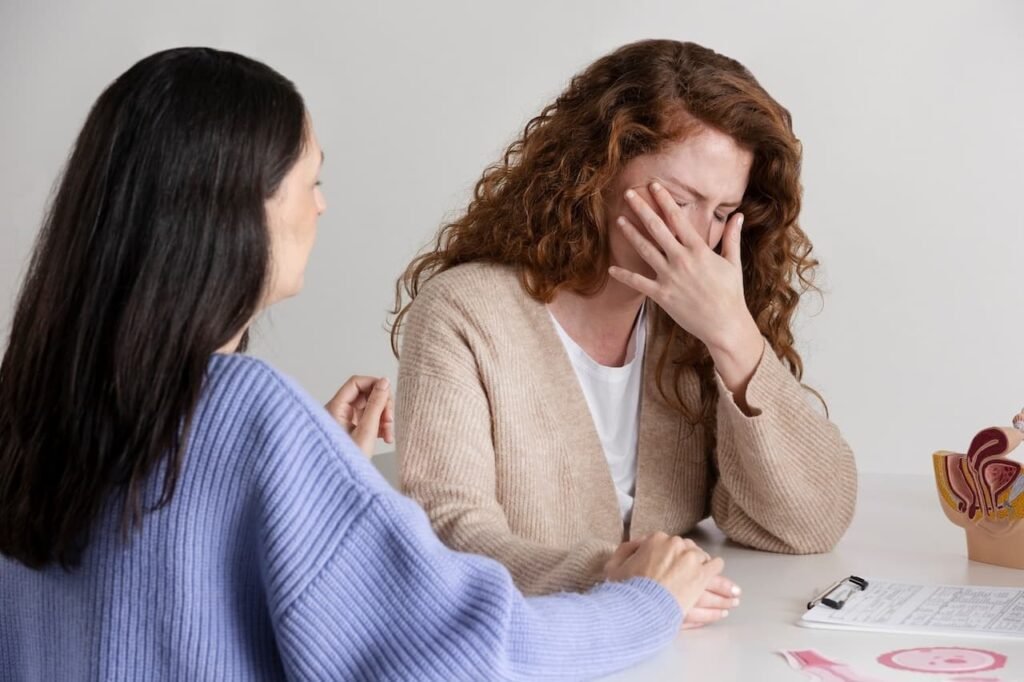Top Psychologists for Depression Counselling
It is totally normal to feel down or sad once in a while but if you are sad most of the times since a long period of time and it is also affecting your life, then you may have what we call is Depression. It can be treated with the help from Psychologists and Counsellors.
Table of Contents
TogglePeople with depression experience feelings of worthlessness, hopelessness; indecisiveness and suicidal tendencies or self-harm. Depression has also multiple risk factors – biological, psychological, social, cultural, economic etc. Depression can even get worse if people start consuming alcohol or do drugs.

The total number of people with depression was estimated to be more than 300 million in 2015, approximately 4.3% of the world’s population. In India, the National Mental Health Survey 2015-16 revealed that nearly 15% Indian adults are experiencing mental health issues. According to the statistics, over 800,000 people die due to suicide every year. And this is highest in the age group of 15-29-year-olds adolescents and young adults.
Every other person that we see is suffering from depression and the rate is only increasing day by day. Thus, Depression Counselling is getting more and more popular because depression is becoming so prevalent these days. Depression can be caused by a number of reasons like loss of job, failure, breakup, divorce, biological reason, etc.
But it can also reoccur easily by the triggers which could be emotional, psychological and physiological in nature. These triggers makes the symptoms come back again. So, Depression Counselling is really beneficial to treat this mental health condition which is impacting a large number of people these days.
What is Depression?
Before getting to understand Depression Counselling, one should know about the Depression as well. So, Depression is a long term feeling of sadness, hopelessness and emptiness that may appear for no apparent reason.
According to the World Health Organization (WHO), it is one of the leading mental health disorders. It can affect any age group be it children, adolescent, young adult or old people. It is put under mood disorders that consist of persistent feelings of sadness and helplessness. It is not like the everyday mood fluctuations due to any hormonal imbalance or stressful situation, it occurs when a person is experiencing negative feelings for a long period of time regardless of the stressful situation or any other cause.

Types of Depression
The following are the types of depression as per by the American Psychiatric Association’s Diagnostic Statistical Manual of Mental Disorders (DSM-5). The Depression Counselling is used for all these types of depression:
Major Depressive Disorder: In this, the person feels depressed most of the times and never has a manic episode. They feel tense and restless and are always worried that something wrong might happen. They sleep poorly and also have suicidal thoughts.
Persistent Depressive Disorder: If the person is suffering from depression that lasts 2 years or more, then it is Persistent Depressive Disorder. It is also known as Dysthymia and Chronic Major Depression. They have trouble focusing on something or making decisions and develop low self-esteem.
Bipolar Disorder: It is also called Manic Depression in which the person’s mood ranges from extreme high energy mood to extreme low energy mood. In the low energy mood, the person will have symptoms of major depression.
Seasonal Affective Disorder: It is a period of major depression that occurs during winter months when there is less and less sunlight and days are shorter. A majority of the people with seasonal affective disorder become depressed in fall/winter season and normalizes in the spring/summer season. This is because they are very responsive to the amount of light available in the environment.
Psychotic Depression: People with Psychotic Depression have the symptoms of depression along with psychotic symptoms like hallucinations, delusions and paranoia.
Premenstrual Dysphoric Disorder: Women with Premenstrual Dysphoric Disorder have depression with symptoms like mood swings, irritability, anxiety issues, sleep irregularities and fatigue.

How to know if you need Depression Counselling?
Depression includes a wide range of emotions but it’s not necessary that one should have all the symptoms to be diagnosed with depression. When a person experiences any 5 or more of the following symptoms for 2 weeks period then he/she can be diagnosed with depression and recommended to get depression counselling. Symptoms of depression are:
- Loss of interest in pleasurable activities
- Fluctuations in body weight and appetite
- Decreased energy
- Sleep problems either insomnia or hypersomnia
- Feelings of worthlessness, hopelessness and helplessness
- Suicidal thoughts
- Inability to focus on something
- Persistent depressed mood
- Negative thoughts all the time
- Reduced libido
- Feeling numb
- Impaired memory
- Inability to function properly
- Social withdrawal
- Problems solving and decision making skills hampered

What happens in Depression Counselling?
The major treatment of depression is through medicines only but alongside depression counselling really helps the client to avoid any relapses. It can help the clients to find ways to deal with the everyday stressors and also encourage themselves to take the medications regularly. Depression Counselling can be a powerful tool to treat depression as according to the researches; medications with counselling have reduced symptoms of depression very well.
Depression Counselling is a short-term and evidence-based treatment recommended by NICE guidelines, for people with depression. Counselling helps to sort out the current problems that you may be facing in your life, such as a loss or a life-change in any aspect of life like job, children, parenting, relationship, friendship, any loss of materialistic thing, etc. It helps the client to make positive changes in thoughts and behaviours and ease the symptoms.

The one to one individual counseling sessions with a client who is depressed can help to know about depression and also understand their situation as well. Client freely express their views and worries in the counselling session and develop various strategies to manage the stress and anxiety that comes along with the depression.
Depression Counselling can help to identify the specific stressors or triggers of the depressive episodes and avoid them altogether so to not let the depression get worse. Counsellor does many activities with the client in the counselling session and gives homework also to increase the self-esteem, improve problem solving skills, enhance healthy relationships and bonding and adopt and then maintain good habits in life.
Counselling is about searching for practical solutions and not about giving advice to the client for their problem. Individual Counselling Sessions helps to ease the stress by letting the client talk about it and make them able to manage the stressors by developing required skills and abilities. Counselling sessions gives a new fresh perspective about the current problems in life so that negativity can be reduced and one can become optimistic.
Counselling helps the client to get in touch with their feelings underlying the depressive episodes that they go through in their life. Being in the counselling sessions, gives them a chance to express their underlying feelings and make sense of them as well in the sessions. Counselling helps you to then develop new ways of looking at yourself and the world around you and thus reduce the overall symptoms of depression.
Majority of the times, the feelings are linked to past experiences of the client and the counsellor helps in exploring the impact of past events on the present day life. It will help to notice patterns of behaviour or thinking which are unhelpful and which could be adversely influencing your mood.
Motivation is given constantly throughout the process of counselling as it helps the client to stick to the medicinal treatment to avoid any relapse of depressive episodes. It may also help in dealing with the side effects of the medicines of depression and catch any signs of depressive episodes.

Strategies which are taught in Depression Counselling
There are many problems that come along with depressive episodes, but the counsellor teaches many methods in the sessions which can be used to manage their depression:
- Practice relaxation techniques
- Have a healthy diet
- Reduce stress and anxiety levels of day to day life
- Exercise and meditate regularly
- Have a proper sleep schedule
- Avoid junk food, drugs, alcohol and smoking
- Socialize regularly
- Have a healthy lifestyle
- Maintain a journal and write feelings and thoughts in it
- Go out in nature

Case study of Depression
Jasmine, a college student was getting good grades in her classes as she was a topper, working in her spare time as a research assistant in a psychology laboratory and had a lot of great friends and a 5-year relationship with a guy. Things soon changed when her boyfriend unexpectedly told her that he was leaving her for someone else. This left her doubts about her other relationships and even about her ability in the classroom and research lab. Her decision making was impacted, her spirits rapidly sank and she began to spend more and more time in bed, refusing to talk with anyone.
Her alcohol consumption increased to the point where she was seldom entirely sober. Within a period of weeks, her grades plummeted due to her inability, or refusal, to attend or complete any assignments. She felt she was a “total failure” even when her friends reminded her of her considerable achievements; indeed, her self-criticism gradually spread to all aspects of her life and her personal history. Finally, her parents convinced her to accept an appointment with a clinical psychologist.

So, there was definitely something “wrong” with Jasmine. The psychologist concluded that Jasmine had major depression which requires treatment. The diagnosis, based on the severity of the symptoms and the degree of impairment, was major depressive disorder and the alcohol addiction as well. She was recommended to visit a Counsellor also for quick and effective improvement of her condition.
Depression Counselling on Medavas
In Depression Counselling, the client and the counselor work together to identify the symptoms and deciding the best course of treatment. Then counselor helps the clients to reduce the symptoms, manage their problems and develop required skills in sessions as well as in the outside environment. And Counselors at Medavas have all the needed and they are specialized in this field as well.
So, if you are suffering from depression and it is affecting your life then you must go for depression counselling. Counsellors at Medavas will manage your behvaiour well and help you in developing various required strategies to manage the depressive episodes. The process of booking the appointment with our counselors is very easy and a smooth process. So, go ahead and book an appointment for yourself to improve the quality of life.

Frequently Asked Questions (FAQs) for Depression Counselling
What are the triggers of Depression?
The most common triggers of depression are stressful life events like changes in job or relationship, any significant loss and family issues. Any medical condition or incomplete treatment can also contribute in relapse of depression or triggering it even more.
Are there any risk factors of depression? If yes, what are the risk factors?
Yes, some people have a higher risk of depression like people who are experiencing certain life events which causes significant change in life, having acute stress, people with family history of depression, people with alcohol addiction or drug addiction, people having any other mental health condition and people with no social support.
What are other treatments for depression?
The various treatments for depression are Cognitive behavioral therapy, Dialectical behavioral therapy, Interpersonal therapy, Pharmacotherapy, Psychodynamic therapy, Family therapy, Group therapy, Life management sessions, Yoga and Meditation sessions and Dance therapy.



















